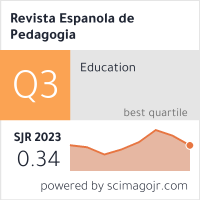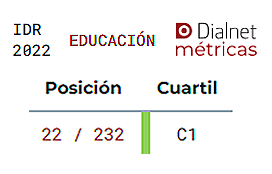Abstract
Today it is more common to find the concept of education linked to terms such as emancipation, autonomy, or freedom, than to norms, discipline, authority, submission or boundaries. This article sets out to show that limits, norms, rules, and even physical limitations are fundamental in education because they are an essential part of human reality and the human condition. Its main thesis is that rules not only regulate human activities from outside, but they also operate from the root of the activity itself as an expression of the peculiar rationality of human beings and their way of being in the world. The article firstly demonstrates this thesis by examining certain physical limitations that are approached educationally, and then in various other human areas, such as language, play, ecology, the Internet, and sexuality. It also shows how rules, by limiting the possibilities for how certain actions will develop, allow us to intuit or glimpse other types of limits and other possibilities —not always better ones— for human development and its standards. From an anthropological perspective, this has led us to suggest how an individual’s future possibilities expand, increase, and develop if her family, school and social settings for growth are spaces bounded by limits and norms. These allow her to feel safe enough to begin a process of critical assimilation of her received inheritance. The subject better understands reality, and the different possibilities for evaluating that reality, when the process of evaluation starts from a relatively enclosed perspective (with limits and norms) on the received tradition.
This is the English version of an article originally printed in Spanish in issue 273 of the revista española de pedagogía. For this reason, the abbreviation EV has been added to the page numbers. Please, cite this article as follows: Reyero, D., & Gil Cantero, F. (2019). La educación que limita es la que libera | Education that limits is education that frees. Revista Española de Pedagogía, 77 (273), 213-228. doi: 10.22550/REP77-2-2019-01
Referencias | References
Barahona, A. (2014). René Girard: de la ciencia a la fe. Madrid: Encuentro.
Barrio, J. M. (1999). Los límites de la libertad. Su compromiso con la realidad. Madrid: Rialp.
Barrio, J. M. (2018). La antítesis naturaleza-cultura en la ideología de género. La igualdad no es “igualitaria”. Fides et Ratio, 3, 91-110.
Butler, J. (1995). Contingent foundations: Feminist and the question of postmodernism. In S. Benhabib, J. Butler, D. Cornell, & N. Fraser (Eds.), Feminist contentions. A philosophical Exchange (pp. 35-58). New York: Routledge.
Carr, N. (2011). Superficiales: ¿qué está haciendo Internet con nuestras mentes? Madrid: Taurus.
Carr, N. (2014). The Glass Cage: How Our Computers Are Changing Us. New York: W. W. Norton & Company.
Château, J. (2017). Los grandes pedagogos. México: FCE.
Chesterton, G. K. (2007). Herejes. Madrid: Acantilado.
De Vries, S. L., Hoeve, M., Stams, G. J., & Asscher, J. J. (2016). Adolescent-Parent Attachment and Externalizing Behavior: The Mediating Role of Individual and Social Factors. Journal of Abnormal Child Psychology, 44 (2), 283-294.
Dunn, D. S., Uswatte, G., & Elliott, T. R. (2009). Happiness, resilience, and positive growth following
physical disability: Issues for understanding, research, and therapeutic intervention. Oxford Handbook of Positive Psychology, 2, 651-664.
Gadamer, H.-G. (1977). Verdad y método. Salamanca: Sígueme.
García-Gutiérrez, J., Gil Cantero, F., & Reyero, D. (2017). El sujeto ético en los estudios universitarios de educación: humanismo, posthumanismo y democracia. Bordón. Revista de Pedagogía, 69 (4), 19-33.
Geertz, C. (1989). La interpretación de las culturas. Barcelona: Gedisa. Giussani, L. (2012). Educar es un riesgo. Apuntes para un método educativo verdadero. Madrid: Encuentro.
Gil Cantero, F. (2018). Escenarios y razones del antipedagogismo actual. Teoría de la Educación. Revista Interuniversitaria, 30 (1), 29-51.
Gomá, J. (2011). Ingenuidad aprendida. Madrid: Galaxia Gutemberg.
Gray, J. (2014). La comisión para la inmortalización. La ciencia y la extraña cruzada para burlar la muerte. México: Sexto Piso. Hadjadj, F. (2016). La suerte de haber nacido en nuestro tiempo. Madrid: Rialp.
Hoeve, M., Dubas, J. S., Gerris, J. R., van der Laan, P. H., & Smeenk, W. (2011). Maternal and paternal parenting styles: Unique and combined links to adolescent and early adult delinquency. Journal of Adolescence, 34 (5), 813-827.
Hoeve, M., Stams, G. J., van der Put, C. E., Dubas, J. S., van der Laan, P. H., & Gerris, J. R. (2012). A Meta-analysis of Attachment to Parents and Delinquency. Journal of Abnormal Child Psychology, 40 (5), 771-785.
Huizinga, J. (2007). Homo Ludens. Madrid: Alianza. Ibáñez-Martín, J. A. (2017). Horizontes para los educadores. Las profesiones educativas y la promoción de la plenitud humana. Madrid: Dykinson.
Ivánninkova, M. (2018). ¿Cuál es el secreto del éxito? El genio del violín, Ara Malikián, comparte su filosofía con Sputnik. Retrieved from https://sptnkne.ws/hBNV (Consulted on 03/10/2018).
Jiménez, L., & Muñoz, M. D. (2012). Educar en creatividad: un programa formativo para maestros de Educación Infantil basado en el juego libre. Electronic Journal of Research in Education Psychology, 10 (3), 1099-1122.
Kofler-Westergren, B., Klopf, J., & Mitterauer, B. (2010). Juvenile Delinquency: Father Absence, Conduct Disorder, and Substance Abuse as Risk Factor Triad'. International Journal of Forensic Mental Health, 9 (1), 33-43.
Llorente, R. (2016). La liberación animal y la cuestión de la legitimidad de la violencia. In I. D. Ávila (Comp.), La cuestión animal(ista) (pp.289-306). Bogotá: Ediciones desde abajo.
MacIntyre, A. (2016). Ethics in the conflicts of modernity. An essay on desire, practical reasoning, and narrative. Cambridge, UK: Cambridge University Press.
Milevsky, A., Schlechter, M., Netter, S., & Keehn, D. (2007). Maternal and paternal parenting styles in adolescents: Associations with self-esteem, depression and life-satisfaction. Journal of Child and Family Studies, 16 (1), 39-47.
Nussbaum, M. C. (2002). Genética y justicia: tratar la enfermedad, respetar la diferencia. Isegoría, 27, 5-17.
Pieper, J. (2003). Las virtudes fundamentales. Madrid: Rialp.
Pontes, H. M., Kuss, D. J., & Griffiths, M.. (2015). Clinical psychology of Internet addiction: a review of its conceptualization, prevalence, neuronal processes, and implications for treatment. Neuroscience & Neuroeconomics, 4, 11-23.
Quale, A. J., & Schanke, A. K. (2010). Resilience in the face of coping with a severe physical injury: A study of trajectories of adjustment in a rehabilitation setting. Rehabilitation Psychology, 55 (1), 12-22.
Riechman, J. (2005). Un mundo vulnerable: Ensayos sobre ecología, ética y tecnociencia. Madrid: La Catarata.
Ricoeur, P. (2009). Educación y política. Buenos Aires: Prometeo.
Rorty, R. (1996). Objetividad, relativismo y verdad Escritos filosóficos I. Barcelona: Paidós. Savater, F. (1999). Las preguntas de la vida. Barcelona: Ariel.
Sawyer, K. (2012). Explaining Creativity. The Science of Human Innovation. New York: Oxford University Press.
Searle, J. R. (2006). ¿Qué es una institución? Revista de Derecho Político, 66, 89-120.
Spaemann, R. (2003). Límites. Acerca de la dimensión ética del actuar. Madrid: Ediciones Internacionales Universitarias.
Spaemann, R. (2017). Prólogo a la edición alemana. In G. Kuby, La revolución sexual global. La destrucción de la libertad en nombre de la libertad (pp.27-29). Madrid: Didaskalos.
Steiner, G. (2016). Un largo sábado. Conversaciones con Laure Adler. Madrid: Siruela. Villacañas, J. L. (2015). Populismo. Madrid: La Huerta Grande.
Citación recomendada | Recommended citation
Reyero, D.,
&
Cantero, F. G.
(2019)
.
Education that limits is education that frees.
Revista Española de Pedagogía, 77(273).
https://www.revistadepedagogia.org/rep/vol77/iss273/13
Licencia Creative Commons | Creative Commons License
Esta obra está bajo una licencia internacional Creative Commons Atribución-NoComercial 4.0.
This work is licensed under a Creative Commons Attribution-NonCommercial 4.0 International License
Palabras clave | Keywords
authority, emancipation, freedom, limits, rules, tradition









